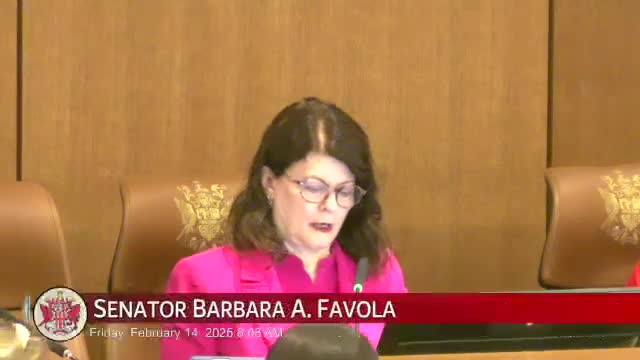Senate committee advances bill to standardize medical cannabis labeling, clarify delivery rules
Get AI-powered insights, summaries, and transcripts
Subscribe
Summary
A Senate committee voted to report House Bill 1989, a substitute that changes labeling requirements for medical cannabis products and clarifies delivery rules and who may make deliveries, citing patient safety and access concerns.
A Senate committee voted to report House Bill 19-89, a substitute carried by Delegate Askew that updates labeling rules for medical cannabis products and clarifies delivery requirements, advancing the measure to the next stage.
The bill directs that edible and topical medical cannabis products be labeled in milligrams and that inhalable products include percentage information for THC and/or CBD, changes the bill’s sponsor and witnesses said are meant to improve patient safety by making doses easier to read. The substitute also adds a definition of “delivery agent,” lists additional places where delivery is prohibited, and states that all transportation or delivery of medical cannabis — whether by an employee or a delivery agent — must comply with the subtitle and any Board regulations.
“This change will make labels significantly easier to read and will more clearly communicate to patients the dose of their medication,” Delegate Askew said, explaining that the statute’s earlier language did not adequately differentiate product types and dose units. Askew added that delivery is important to access, particularly where patients live two hours or more from a dispensing facility.
Testimony at the hearing supported the measure. Jack Page, a founder of Donavan Pharmaceuticals, said his processor has used delivery to reach rural patients since 2020 and urged support. “I urge you to support the bill,” Page said. JM Padini of the National Organization for the Reform of Marijuana Laws said the group supports the bill, and David May, representing JUSHI, said the substitute brings delivery personnel under the same safety and security protocols as employees.
The substitute retains a prohibition on certain delivery destinations, including military-based child day centers, schools, correctional facilities and the state capitol, and reiterates that deliveries must be made in person to patients or their registered agents, with verification required at the time of delivery if the patient is not present. The bill does not change existing limitations on third-party platforms: Delegate Askew said the substitute does not permit DoorDash, Uber Eats or similar services to perform deliveries.
The committee adopted a substitute amendment detailing these changes and then voted to report the bill. The roll call showed 11 in favor and 2 opposed.
